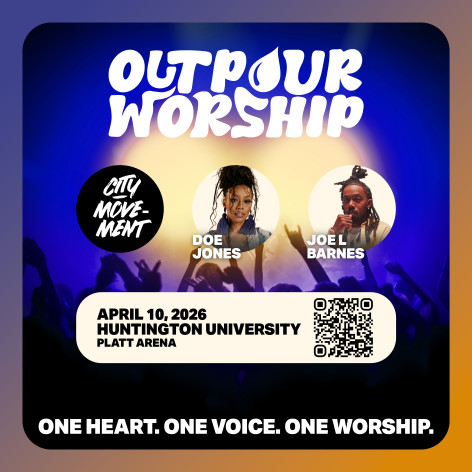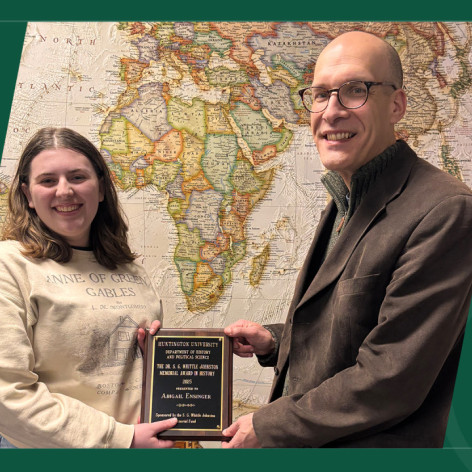Students, professors tour civil rights movement sites
FOR RELEASE: Monday, January 30, 2006
Huntington, Ind. "Huntington University's Jesse Brown and Dr. Norris Friesen had a dream. For J-term, Brown, director of residence life and director of student programs, and Friesen, vice president and dean of the University, recently took a group of students to Montgomery, Ala., Birmingham, Ala., Selma, Ala., Memphis, Tenn., and Atlanta, Ga., on a tour of the significant sites and landmarks of the civil rights movement.
Beginning on January 8, Brown, Friesen and six students "Ross Blakely, Laura Hustedt, Rob Sackett, Trevor Shelito, Ben Thompson, and Christina Warner "went on an eight-day trip to the South. They visited sights such as the Lorraine Motel, the National Civil Rights Museum, 16th St. Baptist Church, the Edmund Pettis Bridge, and the Rosa Parks Museum.
Friesen explained that he wanted to take this trip because of his interest in the civil rights movement and its successful nonviolent strategy. He was also interested in Dr. Martin Luther King Jr.'s ability to articulate a vision and to see it become a reality.
The decades-old stories came to life for this group as they followed the path and the people of this movement. They heard the accounts of disaster and courage, saw the landmarks of history, and walked the paths of some of this country's greatest activists. Warner, a sophomore Bible & religion major from Bloomington, Ind., was able to interact with the life of Dr. Martin Luther King Jr. in a fresh and new way.
We learned a little in high school, about how Dr. King was a good man who made some pretty great speeches, she said. But as cheesy as it may sound, when it comes down to it, he was a modern-day Moses. He literally led God's children out of oppression and into a life of greater freedom. Reading some of his letters, especially 'The Letter from the Birmingham Jail,' was like reading one of Paul's prison epistles.
Yet, the most memorable experiences from Warner's perspective were the encounters with people who were involved in the movement. The character of these activists is what stood out to her.
I never wondered about their integrity, she said. They had endured incredibly hard circumstances before and during the movement, and you knew that they would do it all again. They aren't the type of people who will sit passively while people are being wronged. They'll work for what is right and do what is necessary. They are doers, not watchers, and that's what makes the difference.
Friesen also was affected by the people and their stories in connection with the movement.
To see a man sitting in the church and wiping tears when the speaker talks about the four girls killed in the First Baptist Church bombing in Birmingham is very moving, he said. Or to meet a white pastor in Montgomery who took the bold move to become involved with the Montgomery Bus boycott and to hear that his home was bombed five times because of his role is sobering.
For some of the students, sympathy wasn't so easy. Sackett, a junior youth ministries major from Lima, Ohio, said that his experiences in the South have opened his eyes to the prejudices that he was brought up in, and yet there was still so much that he couldn't even comprehend.
As I began to try to sympathize with these people who were fighting, Sackett said, I found myself struggling to bring myself out of the 'white' mindset. It was my past and my upbringing that branded me with minor prejudices that I did not notice.
Warner echoed this self realization.
There's no way to see the things that we saw and not come away with a greater awareness of how you've seen yourself as better than others, she said.
These minor prejudices are still very widespread today. Friesen commented on how the law may be obeyed today, but the spirit of racism and prejudice still exists.
We talked a lot about how we can continue to dismantle the walls of racism, Friesen said. I think by going to Alabama and Georgia, we see that the job is not yet done and we have work to do.
The work left to be done goes far beyond only that of racial tensions. Warner spoke of the groups of people just within the borders of this country who are experiencing severe prejudice and discrimination, such as Native Americans, homosexuals, people of Middle Eastern descent, and the poor.
My hope and prayer is that we can become advocates for peace and reconciliation and abhor all forms of prejudice and racism, said Friesen.
So the dream continues.
The civil rights movement, Warner said, it isn't over yet."



